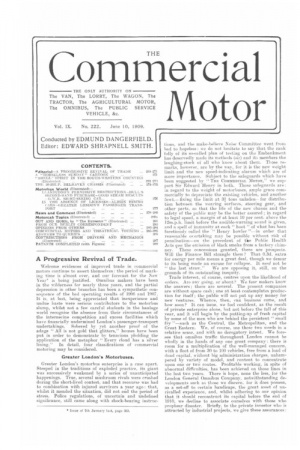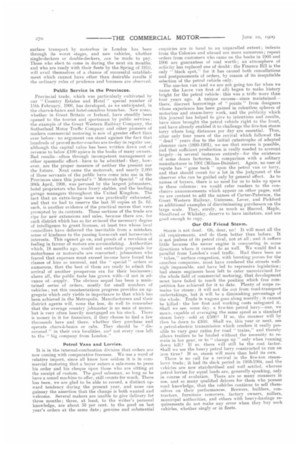Greater London's Motorbuses.
Page 1

Page 2

If you've noticed an error in this article please click here to report it so we can fix it.
Greater London's motorbus enterprise is a case apart. Steeped in the traditions of exploded practice, its giant was successively weakened by a series of unanticipated happenings. True, several mushroom rivals were crushed during the short-lived contest, and that recourse was had to combination with injured survivors a year ago : that, whilst it mended the situation, did not end the period of stress. Police regulations, of uncertain and undefined significance, still came along with shock-bearing instruc
thins, and the make-believe Noise Committee went from bad to hopeless: we do not hesitate to say that the rank folly of its so-called plan of testing on the Embankment Las deservedly made its methods (sic) and. its members the laughing-stock of all who know about them. Those remarks, however, are by the way, for it is the new weight limit and the new speed-indicating alarum which. are of more importanee. Subject to the safeguards which have been suggested by " THE COMMERCIAL MOTOR," we support Sir Edward Henry in both. Those safeguards are: in regard to the weight of motorbuses, ample grace commercially to depreciate the existing vehicles, and another cwt.fixing the limit at 3* tons unladen-for distribution between the wearing surfaces, steering gear, and other parts, so that the life of the new chassis and the safety of the publie may he the better assured ; in regard to legal speed, a margin of at least 10 per cent. above the 12m.p.h. limit before the audible-warning sound is given, and a spell of immunity at each " hoot " of what has been facetiously called the " Henry howler "--in order that reasonable overtaking rimy be possible without risk of penalisation--on the precedent of tie Public Health Acts qua the emission of black smoke from a factory chimney. These concessions granted, there are prospects. Will the Finance Bill strangle -them ? That 0.3d. extra for energy per mile means a great deal, though we demur to its being made an excuse for collapse. It need not be
" the last straw." We are opposing it, still, on the grounds of its outstanding inequity. Trade interest, of course, centres upon the likelihood of orders. Are any going, or about ? We fear makers know the answers; there are several. The present companies are without spare cash ; one at least contemplates production for itself ; the public will not put up any money for new ventures. Whence, then, ean business come, and how soon? It can issue, we feel confident, as the result of private enterprise alone, but not before the fall of this year, and it will begin by the putting-up of fresh capital by some of the men who are behind the persistent "small fry "—such as the Central, the Metropolitan, and the Great Eastern, 'We, of course, use those two words in a relative sense, and with no derogatory intent. We foresee that omnibus traffic, throughout London cannot be wholly in the hands of any one great company : there is room for a multiplication of the well-managed concern, with a fleet of from 30 to 100 vehicles, free from a load of dead capital, without big administration charges, unhampered by variety of model, and content to concentrate upon one or two routes. Profitable working, in spite of abnormal difficulties, has been achieved on those lines in the last two years. There is hope, none the less, for the London General Omnibus Company, notwithstanding developments such as those we discern, for it does possess, as a set-off to certain handicaps, the great asset of onrivalled experience, and, whilst adhering to our opinion that it should reconstruct its capital before the end of 1910, we decline to associate ourselves with those who prophesy disaster. Briefly, to the private investor who is attracted by industrial projects, we give these assurances:
surface transport by motorbus in London has been through its worst stages, and new vehicles, whether single-deckers or double-deckers, can be made to pay. Those who elect to come in during the next six months, and who are ready with their fleets by the Spring of 1910, will avail themselves of a chance of successful establishment which cannot have other than desirable results if the ordinary rules of prudence and business are observed.






















